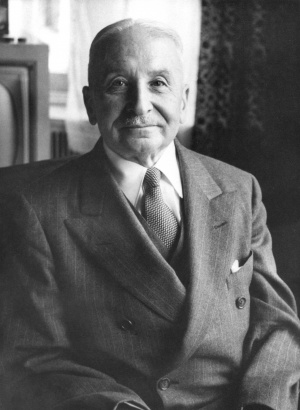Différences entre les versions de « Ludwig von Mises »
| Ligne 21 : | Ligne 21 : | ||
== Bibliographia == | == Bibliographia == | ||
| − | {{Amazon| | + | {{Amazon|2130385982}} |
{{DEFAULTSORT:Mises, Ludwig von}} | {{DEFAULTSORT:Mises, Ludwig von}} | ||
{{Facebook}} | {{Facebook}} | ||
Version du 15 mai 2018 à 10:11
Citationes
« L'économie de marché n'a pas besoin d'apologistes ni de propagandistes. [...] Si vous cherchez son monument, regardez autour de vous. »
- Ludwig von Mises, L’Action humaine (1949), trad. Raoul Audouin, éd. Presses universitaires de France, coll. Libre échange, 1985 (ISBN 9782130385981), chap. XXXV
"The gold standard has one tremendous virtue: the quantity of the money supply, under the gold standard, is independent of the policies of governments and political parties. This is its advantage. It is a form of protection against spendthrift governments."
- Ludwig von Mises, Economic Policy, p. 65
“So much for the domestic policy of Fascism. That its foreign policy, based as it is on the avowed principle of force in international relations, cannot fail to give rise to an endless series of wars that must destroy all of modern civilization requires no further discussion. To maintain and further raise our present level of economic development, peace among nations must be assured. But they cannot live together in peace if the basic tenet of the ideology by which they are governed is the belief that one's own nation can secure its place in the community of nations by force alone.
It cannot be denied that Fascism and similar movements aiming at the establishment of dictatorships are full of the best intentions and that their intervention has, for the moment, saved European civilization. The merit that Fascism has thereby won for itself will live on eternally in history. But though its policy has brought salvation for the moment, it is not of the kind which could promise continued success. Fascism was an emergency makeshift. To view it as something more would be a fatal error.”
- Ludwig von Mises, Liberalism: A Socio-Economic Exposition (Studies in economic theory), trans. R. Raico, Mission, KS: Sheed Andrews and McMeel, 1978
- „Soviel über die innerpolitische Stellung des Faszismus. Daß er außenpolitisch durch das Bekenntnis zum Gewaltprinzip im Verhältnis von Volk zu Volk eine endlose Reihe von Kriegen hervorrufen muß, die die ganze moderne Gesittung vernichten müssen, bedarf keiner weiteren Ausführung. Der Fortbestand und die Fortentwicklung der wirtschaftlichen Kultur der Gegenwart verlangen Sicherung des Friedens zwischen den Völkern. Die Völker aber können sich nicht vertragen, wenn sie von einer Ideologie beherrscht werden, die glaubt, durch Gewalt allein die Stellung des eigenen Volkes im Kreise der Völker sichern zu können.
- Es kann nicht geleugnet werden, daß der Faszismus und alle ähnlichen Diktaturbestrebungen voll von den besten Absichten sind und daß ihr Eingreifen für den Augenblick die europäische Gesittung gerettet hat. Das Verdienst, das sich der Faszismus damit erworben hat, wird in der Geschichte ewig fortleben. Doch die Politik, die im Augenblick Rettung gebracht hat, ist nicht von der Art, daß das dauernde Festhalten an ihr Erfolg versprechen könnte. Der Faszismus war ein Notbehelf des Augenblicks; ihn als mehr anzusehen, wäre ein verhängnisvoller Irrtum.“
- Ludwig von Mises, Liberalismus (1927), Gustav Fischer Verlag, p. 45
